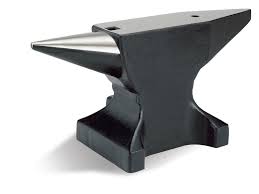
记忆方法
记忆“anvil”的方法可以是将它分解为“a”和“nvil”。想象一个“a”字母放在一个“nvil”形状的物体上,这个形状像一个锤子和铁砧的结合,即一个锻造用的铁砧。这样“anvil”的形象就与打铁匠的工作场景联系起来,帮助你记忆它的意思。
以上内容由AI生成, 仅供参考和借鉴
中文词源
anvil 砧板
an同on. -vil, 同词根pul, 击,打,见pulse, 脉膊。
英语词源
- anvil
-
anvil: [OE] Etymologically, an anvil is ‘something on which you hit something else’. The Old English word was anfīlte, which came from a prehistoric West Germanic compound formed from *ana ‘on’ and a verbal component meaning ‘hit’ (which was also the source of English felt, Latin pellere ‘hit’, and Swedish dialect filta ‘hit’). It is possible that the word may originally have been a loan-translation based on the Latin for ‘anvil’, incūs; for this too was a compound, based on in ‘in’ and the stem of the verb cūdere ‘hit’ (related to English hew).
=> appeal - anvil (n.)
- Old English anfilt, a Proto-Germanic compound (cognates: Middle Dutch anvilt, Old High German anafalz, Dutch aanbeeld, Danish ambolt "anvil") from *ana- "on" + *filtan "hit" (see felt (n.)). The ear bone so called from 1680s. Anvil Chorus is based on the "Gypsy Song" that opens Act II of Giuseppe Verdi's opera "Il Trovatore," first performed in Teatro Apollo, Rome, Jan. 19, 1853.
权威例句
- 1. His independence had been forged on the anvil of a harsh environment.
- 他的独立性是在艰苦的环境中锤炼出来的。
- 2. A good anvil does not fear the hammer.
- 真金不怕火炼,好汉不怕考验.
- 3. The blacksmith shaped a horseshoe on his anvil.
- 铁匠在他的铁砧上打出一个马蹄形.
- 4. The scheme is still on the anvil.
- 这计划尚在筹划中.
- 5. The anvil onto which the staples are pressed was not assemble correctly.
- 订书机上的铁砧安装错位.
